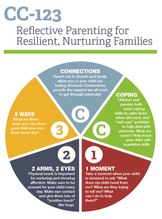Stress operates along a continuum. In small or moderate doses, stress can be beneficial. However, stressful experiences in childhood that are powerful, frequent, prolonged, and in unpredictable doses can be detrimental to a child’s development and life-long health. Clinicians and staff in the health care field have a unique opportunity to address toxic stress in individuals and to advocate for system-changes that create the conditions for families to thrive.
Opportunities to RespondHere are ways you can get started in responding to ACEs in your role.
|
Sign up to receive ongoing updates in health care
|
Handouts
Handouts for talking with parents and caregivers about child stress and how to respond, developed by Dr. Amy Shriver, a pediatrician based in Des Moines.

|
| ||||||||||||
Pediatric Guide
|
As a near universal access point for children in our state, pediatric and family practice clinics are well-positioned to support prevention and early identification of stressors with families. The ACEs Pediatric Project seeks to support practice change in pediatric and family care clinics through education and technical assistance. Core components of the project include:
|
Additional Resources
Health Care
The resources included in this section are particularly relevant for professionals working in the field of health care. Mental health professionals and other professionals who work in hospital or clinical settings and public health professionals may also find these resources relevant to their work.
The resources included in this section are particularly relevant for professionals working in the field of health care. Mental health professionals and other professionals who work in hospital or clinical settings and public health professionals may also find these resources relevant to their work.
- American Academy of Pediatrics ACEs Resources
- PACES Connection Groups:
- Child Development
- Screening
- Iowa Models
- 1st Five for young kids and their families
- Nine2Thrive model for pregnant birthing people
- Dr. Nadine Burke-Harris’ Center for Youth Wellness
- Kaiser Permanente Center for Total Health
Mental Health
The resources included in this section are particularly relevant for mental health professionals. Other health professionals who work in hospital or clinical settings and public health professionals may also find these resources relevant to their work.
The resources included in this section are particularly relevant for mental health professionals. Other health professionals who work in hospital or clinical settings and public health professionals may also find these resources relevant to their work.
- Trauma-Informed Care Project
- The National Child Traumatic Stress Network
- Iowa Association for Infant & Early Childhood Mental Health
- Trauma-Focused Cognitive Behavioral Therapy
- Eye Movement Desensitization and Reprocessing (EMDR)
- Circle of Security:
- Art therapy
- Play therapy
- Attachment, Self-Regulation and Competency (ARC)
- Practicing Resilience for Self-Care & Healing
